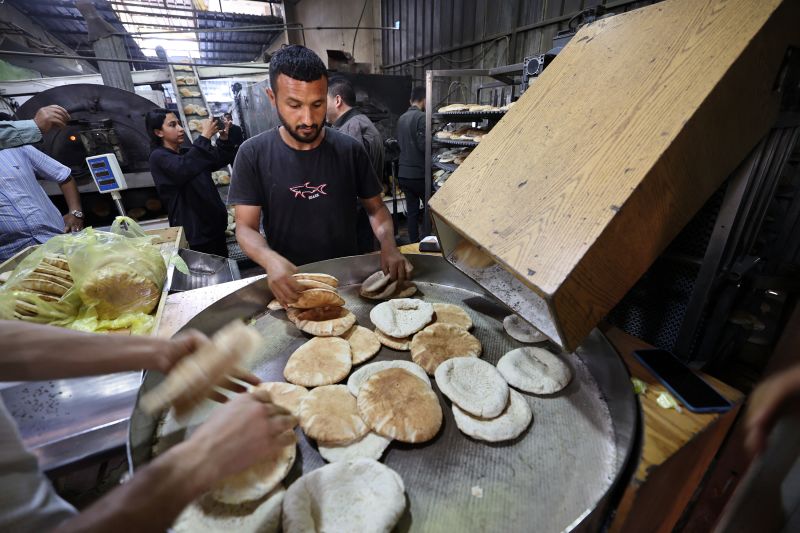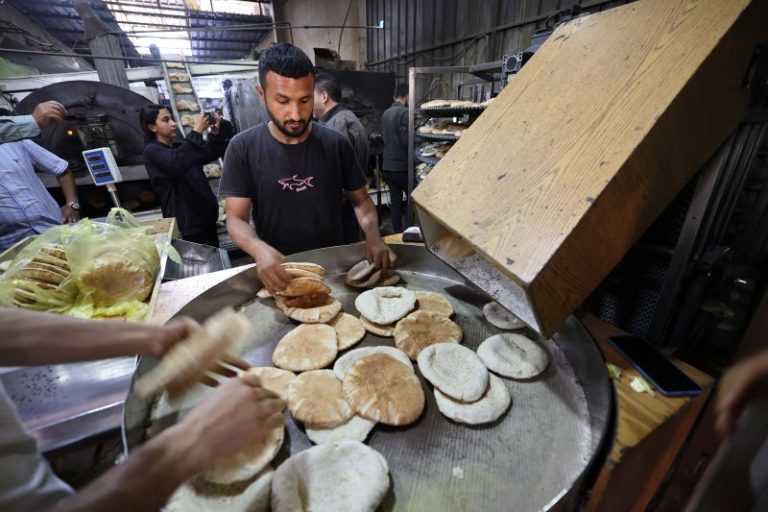
Hours after the Al Haj bakery handed out its last piece of bread on Thursday, Jihad Al Shafie was still waiting, his hope of bringing some food to his family long gone.
Like many in the crowd standing outside the bakery in central Gaza, Al Shafie lined up early in the morning, anticipating freshly baked pita from the first deliveries of flour to enter the besieged territory since early March. He was forced to leave empty-handed, as many of the promised truckloads of food remained in southern Gaza, a dozen or so miles away.
For one hour on Thursday afternoon, the bakery “experienced unprecedented invasions,” according to the owner, as a mob descended on the facility in a scramble for food. Through the small window separating the workers inside from the crowd, desperate hands reached in, trying to get lucky enough to secure a bag of bread. The chaos vanished as quickly as the bread, leaving scores with nothing.
Ina’am Al Burdeini walked an hour from Al-Maghazi refugee camp to the bakery, only to find a crowd already there when she arrived. She, too, left empty-handed. “It’s exhausting, and we feel lost and abandoned,” said Al Burdeini, directing her anger both inside and outside of Gaza. “People are desperate. It’s time for action, not empty promises. Hamas get out!”
This week, Israel began allowing in the first trucks with food and humanitarian supplies since imposing a complete blockade of humanitarian goods on Gaza on March 2. More than 300 trucks of aid have entered Gaza since Monday, according to Israel’s Coordinator for Government Activities in the Territories (COGAT), which oversees deliveries.
It is a fraction of the aid that entered before the war, when 500 to 600 trucks per day came into Gaza, according to the United Nations. On Thursday, COGAT claimed “there is no food shortage in Gaza,” despite Israeli Prime Minister Benjamin Netanyahu’s office saying this week that Israel was allowing “a basic amount of food” into Gaza “in order to prevent a humanitarian crisis.”
‘Needle in a haystack’
“The aid going in now is a needle in a haystack,” said Philippe Lazzarini, head of the UN Relief and Works Agency for Palestine Refugees (UNRWA), on social media. “A meaningful & uninterrupted flow of aid is the only way to prevent the current disaster from spiraling further.”
And not all of the aid is reaching the Palestinian population, with some held up because of unsafe transit routes or looted on its way to distribution points. None of the trucks reached northern Gaza, where Israel has issued several evacuation warnings recently.
The World Food Programme (WFP) said 15 of its trucks were looted in southern Gaza while on their way to bakeries supported by the UN organization.
“Hunger, desperation, and anxiety over whether more food aid is coming, is contributing to rising insecurity,” said the WFP in a statement Friday. “We need support from the Israeli authorities to get far greater volumes of food assistance into Gaza faster, more consistently, and transported along safer routes, as was done during the ceasefire.”
The Palestinian NGOs Network condemned the looting of the humanitarian aid trucks. “The trucks, loaded with flour and intended to supply bakeries in Gaza City and the northern governorates, were looted — depriving children and families already enduring severe hunger of their basic food needs,” said the umbrella organization.
A joint US-Israeli aid program, called the Gaza Humanitarian Foundation, is supposed to start operating four distribution sites before the end of the month. But the UN and other humanitarian organizations have refused to work with the new group.
The new plan has come under criticism from top humanitarian officials, who warn that it is insufficient, could endanger civilians and even encourage their forced displacement.
The UN’s aid chief, Tom Fletcher, said last week that time should not be wasted on an alternative Gaza aid plan, writing on X: “To those proposing an alternative modality for aid distribution, let’s not waste time: We already have a plan.”
On Friday, the Bakery Owners Association in Gaza announced that bakeries would refuse to operate “in light of the difficult circumstances facing the Gaza Strip,” calling on the WFP to distribute flour to families first.
The chairman of the association, Abdel Nasser Al-Ajrami, appealed to international organizations to “urgently intervene” with Israel to allow the entry of “flour, sugar, yeast, salt, and diesel fuel” so that bread is available for everyone.

